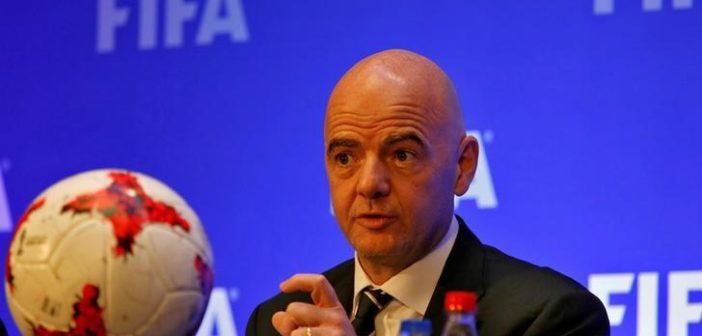n a flurry of decisions, FIFA on Friday in India announced an increased the total prize money of the 2018 World Cup by 12 percent and proposed to have a combined youth World Cup instead of separate U-17 and U-19 events from 2020 onwards.
Addressing the media after a Council meeting held in India on the sidelines of U-17 World Cup, FIFA President Gianni Infantino announced that the powerful body has approved an increase in the prize money for the 2018 FIFA World Cup in Russia to USD 400 million. It is a 12 per cent increase from the USD 358 million for the 2014 edition.
The 2018 World Cup champion will get $38 million. Three years ago, World Cup champion Germany received $35 million and runner-up Argentina got $25 million. Next year, the runner-up will also get a $3 million increase to $28 million.
The third- and fourth-place teams will each get a $2 million increase to $24 million and $22 million, respectively. The quarterfinalists will each get $16 million, also a $2 million increase, and teams eliminated in the last 16 get a $3 million increase to $12 million.
Each of the 32 competing national federations in Russia will get at least $8 million, the same as in 2014 when the overall prize fund was $358 million. Teams will also get $1.5 million from FIFA toward the costs of preparing for the tournament same as in 2014.
The prize fund comes from World Cup revenues that FIFA has projected to exceed $5 billion despite corruption probe in the US and Switzerland, and lethargic sales of sponsorship.
Infantino said that the Council also decided to close the long-standing Israel-Palestine issue as football cannot solve political issues and his body will need to remain neutral in such matters.
“We have taken a decision on the report of FIFA Monitoring Committee (of Tokyo Sexwale) on Israel-Palestine issue. The Council has taken note of all relevant documents including the United Security Council resolution. We have decided that FIFA cannot take positions on such documents. Due to complexities of the issue and great sensitivity due to certain de facto circumstances, we felt a non governmental organisation like FIFA cannot make changes unilaterally.”
He spoke on the eve of the final between England and Spain. “We have limitations and FIFA will have to be neutral in political matters. This territories are a concern of competent international public law authorities and any interference by FIFA in the status quo in this territories in terms of football matter will further aggravate the football situation not only in these territories but in the whole area.
“So, the FIFA Council has refrained from imposing any sanctions and declared the issue as closed until the legal and de facto framework has changed,” he added.
The FIFA Council also ratified the decision of the Bureau of the Council of 6 September 2017 to approve the enhanced bidding regulations for the 2026 World Cup, and appointed the members of the Bid Evaluation Task Force.
According to the bidding regulations, the task force must comprise the chairpersons of the Audit & Compliance Committee and the Governance Committee ? in this case, Toma? Vesel and Mukul Mudgal respectively ? as well as a member of the Organising Committee for Competitions (Ilco Gjorgioski was appointed), together with experts from the administration: Deputy Secretaries General Zvonimir Boban (football) and Marco Villiger (administration).
The Council passed a resolution for the establishment of the FIFA Foundation, with the purpose of providing a solid legal and institutional basis for FIFAs social development initiatives. One of the core intentions of the FIFA Foundation will be to institutionalise a commitment of the FIFA legends to engage in such activities and act as promoters of the bodys aims and objectives related to social development.
The foundation should be operational by the first quarter of 2018 and will initially comprise the FIFA president and two members of the FIFA Council, Sonia Bien-Aime and Kwesi Nyantakyi. Later in the year, the FIFA Council will appoint a selection of respected personalities from football and other areas of society as additional members of the foundation board.
A decision was also taken to engage in consultation to discuss a review of FIFAs women, youth and club tournaments. A number of different draft formats will be submitted for discussion with the member associations at the FIFA Executive Football Summits as well as with the confederations and other relevant stakeholders.
Final concepts are planned to be submitted to the FIFA Council for approval during the bodys next meeting on March 15 and 16 in Bogota, Colombia.
The Council also approved the dates of FIFA tournaments. The FIFA U-20 Womens World Cup will be held in France from August 5-24 next year while Uruguay will host the FIFA U-17 Womens World Cup from November 13 to December 1 next year.
The FIFA Club World Cup will be held in the UAE from December 12 to 22 next year while the FIFA Womens World Cup will be held in France from June 7 to July 7 in 2019.




